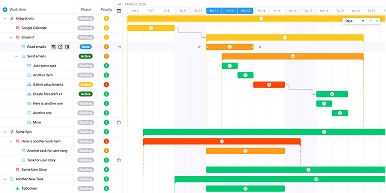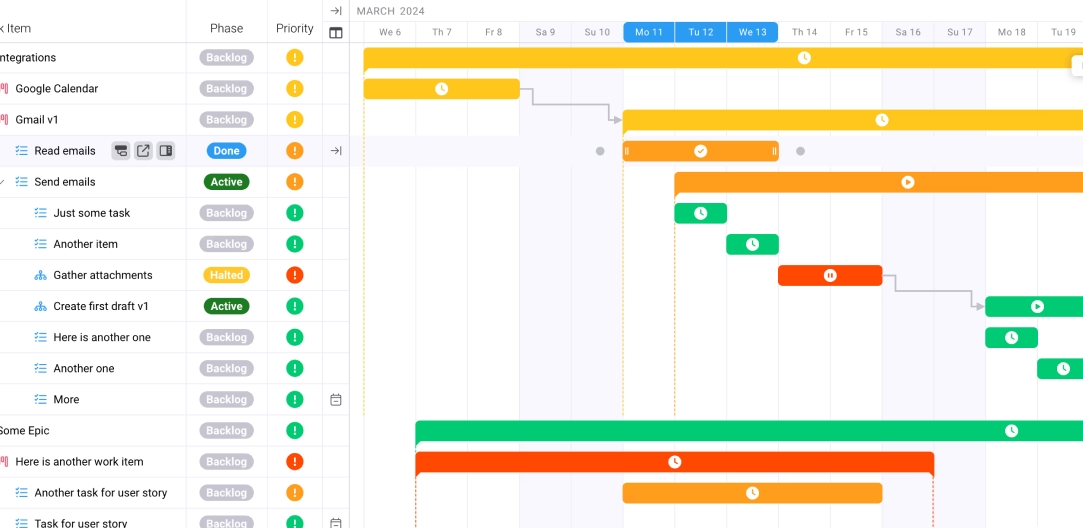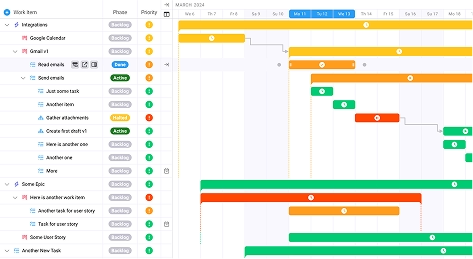
Top Project Management Trends to Watch in 2025: Key Insights
Key takeaways:
As digital transformation accelerates and remote work becomes more entrenched, project managers face increasing pressure to evolve. The coming year will mark a significant shift in how work is planned, executed, and analyzed. These project management trends not only reflect changing technologies but also a broader transformation in organizational culture and leadership. In this guide, we explore the top project management trends to watch in 2025, offering key insights for agency leaders, COOs, and project professionals looking to stay competitive.
1. The Rise of Integrated Platforms for Smarter Execution
Gone are the days when teams could get by with separate tools for scheduling, communication, and budgeting. Modern agencies now demand unified systems that combine features like project management, CRM, billing, resource planning, and time tracking. According to Ravetree’s analysis, this convergence enables teams to eliminate data silos, optimize resource allocation, and dramatically improve productivity.
2. AI-Driven Project Forecasting and Automation
AI is no longer a futuristic add-on; it’s becoming essential. Project management tools are increasingly incorporating artificial intelligence to forecast delivery timelines, flag resource bottlenecks, and automate repetitive workflows. According to a study by the Project Management Institute, 81% of project professionals believe AI will impact their work within the next three years. Expect to see more tools using predictive analytics to reduce risks and increase project success rates.
3. Emphasis on Outcome-Based Metrics
In 2025, agencies will move away from vanity metrics and instead focus on real business outcomes. This trend aligns with Ravetree’s KPI-focused recommendations for project managers. The focus will shift to metrics such as ROI, client satisfaction, on-time delivery, and budget adherence, ensuring project alignment with overall business strategy.
4. Agile Marketing Becomes Mainstream
Agile methodology is evolving beyond IT departments and becoming a staple in marketing and creative agencies. Teams are leveraging Agile to speed up deliverables, improve adaptability, and drive collaboration. However, the transition is not without challenges. Successful implementation of Agile requires cultural buy-in, proper training, and tools that support Agile workflows.
5. Enhanced Client Visibility Through Portals
Transparency is no longer optional. Clients now expect real-time access to timelines, budgets, and deliverables. Tools that offer an integrated client portal are gaining popularity, allowing agencies to build trust, reduce back-and-forth communication, and streamline approvals. This aligns with broader trends in client service that prioritize open collaboration.
6. Expansion of Remote and Hybrid Work Models
The normalization of remote work has had a profound impact on project management practices. According to Harvard Business Review, remote teams require better planning tools, more frequent check-ins, and new forms of digital collaboration. As a result, we’ll see a rise in platforms that support asynchronous communication, virtual whiteboarding, and time zone management.
7. Greater Emphasis on Soft Skills and Emotional Intelligence
While technical skills remain important, soft skills like communication, empathy, and conflict resolution are becoming critical for project success. According to Forbes, emotional intelligence enhances leadership, team cohesion, and client relations—factors that directly influence project outcomes.
8. Deeper Integration with Financial Tools
More agencies are realizing the value of connecting project management systems to accounting software. This enables real-time tracking of budgets, margins, and profitability. Integrations with QuickBooks and similar platforms help teams stay on top of finances without redundant data entry.
9. Customizable Rate Cards and Role-Based Billing
In service-based industries, one size does not fit all. In 2025, expect to see more advanced features like role-based billing, time tracking by team member, and flexible rate cards with specific start and end dates. These capabilities provide granular visibility into project costs and make it easier to manage multi-role assignments on a single task.
10. Sustainability and Ethical Project Management
Sustainability is becoming a business imperative. Agencies are beginning to factor in environmental and social impacts when planning and executing projects. Sustainable project practices are not only ethically sound but also lead to long-term business benefits, such as brand loyalty and regulatory compliance.
11. Integration of Marketing and Project Management
Marketing and operations teams are working more closely than ever, leading to an integrated approach to planning and execution. Streamlined collaboration between departments enhances both strategic alignment and tactical execution.
12. Increased Use of Data-Driven Decision Making
As analytics capabilities grow, more project managers are relying on data to inform decisions. Whether it’s performance dashboards or historical project benchmarks, data empowers managers to optimize workflows, allocate resources effectively, and forecast outcomes with greater confidence.
13. Role of COOs in Strategic Project Leadership
COOs are stepping into more strategic roles, especially in marketing agencies. COOs who leverage project management tools for financial insight and resource planning can significantly accelerate agency growth.
14. Cross-Functional Teams and Collaboration
Cross-functional collaboration is no longer a buzzword—it’s a necessity. Teams comprised of designers, developers, strategists, and analysts must collaborate fluidly. Such teams improve innovation and reduce project silos, leading to faster and more effective delivery.
15. Client Retention as a Strategic Priority
High-performing agencies understand that project success doesn’t end at delivery—it’s about maintaining long-term client relationships. Strategies for improving retention include real-time reporting, value delivery, and communication transparency. These client retention strategies are proving to be essential in an increasingly competitive landscape.
16. On-Demand Talent and the Gig Economy
As freelancing becomes more normalized, agencies are tapping into on-demand talent pools to scale project teams. This trend increases flexibility but also requires better onboarding systems, role definition, and compliance management. According to the U.S. Bureau of Labor Statistics, over one-third of U.S. workers are part of the gig economy, and the number is growing.
17. Smart Dashboards and Visual Reporting
The future of reporting lies in interactivity. Project dashboards now include customizable widgets, real-time updates, and role-specific views. As shown in this software comparison, these dashboards are essential for both high-level executives and frontline team members who need actionable insights fast.
18. Marketing Tech and Workflow Synergy
New marketing technologies are reshaping how campaigns are executed and measured. Emerging martech like AI-powered SEO tools, automated content creation, and cross-platform analytics require seamless integration into existing workflows. This synergy between marketing and project tools is key for agencies to remain agile.
Final Thoughts
As we move further into 2025, the project management landscape is set to become more intelligent, integrated, and client-focused. From AI-driven forecasting to sustainable project execution, staying ahead of these project management trends will be essential for forward-thinking agencies. Adapting to these shifts will not only enhance team performance but also align project outcomes with strategic business goals. Embracing the top project management trends to watch in 2025 positions your agency for long-term success and reinforces your competitive edge in an evolving marketplace.









